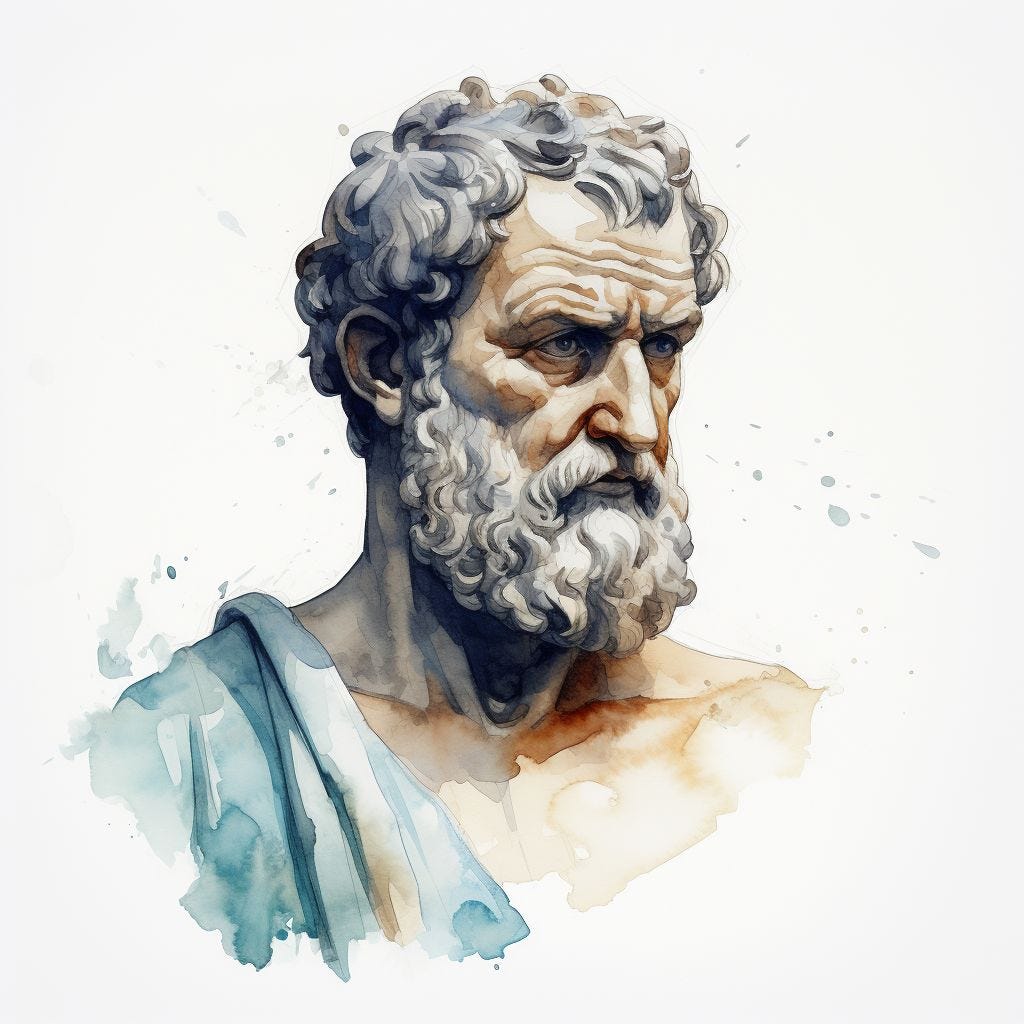You Don't Need Many Arguments to Prove a Point
How to simplify
Welcome to The Stoa Letter, the newsletter on Stoic theory and practice.
Every week we share two emails to help you build resilience and virtue with ancient philosophy. Each email includes one meditation on Stoic theory, one action to do in order to become more Stoic, and links to the best resources we’ve found.
🏛️ Theory
One should always simplify your thoughts to what is essential.
As the Stoic teacher, Musonius Rufus once said:
“It is not the doctor who brings many drugs to sick people who deserves praise, but rather the one who helps them in a noteworthy manner with the few drugs which he prescribes.
Musonius Rufus, Lectures 1
Musonius Rufus is highlighting this fact to his Roman philosophy students. These were the kind of people prone to debating and disputing argument after argument. But as the Stoic Aristo of Chios said:
Dialectic reasonings are like cobwebs—artificially constructed, but otherwise useless.
Don’t waste time on many words when only a few are needed.
This is easier said than done. The French philosopher Blaise Pascal once quipped that he made a letter longer than usual because he “did not have the time to make it shorter.”
Carving thought down to its essentials demands cutting through a morass of distractions, confusion, and silence.
This is most evident when one is making a decision. To do so you may consider arguments for this or that.
But most arguments are not very good. If you’re thinking of making a big decision you may write up a pro-con list – perhaps with tens of items. Only a handful of those points are actually important. Everything else is noise.
So, what’s an example of a good argument? Musonius Rufus gives one:
If we take the well-known premise that every good is desirable and if we add to this the second well-known premise that some pleasures are not desirable, we show that pleasure is not a good-we show the unfamiliar through the familiar.
Musonius Rufus, Lectures 1
Taking pleasure in our own failure or the suffering of others is not admirable. So, pleasure cannot be intrinsically good.
That kind of clear and simple reasoning ought to be what we’re after. And then we must act.
After all, as Musonius Rufus says:
Only by exhibiting actions in harmony with the sound words which he has received will anyone be helped by philosophy.
Musonius Rufus, Lectures 1
🎯 Action
Simplify one area of your thought today. If you can, write it down.
🔗 Links
🥁 Without guidance or a community, it can be difficult to apply Stoic lessons when you need them most. We’re putting together a course this fall for people to learn the foundations of Stoic theory and practice – with others serious about becoming more Stoic. Stay tuned.
🖋️ Here’s a piece on this same theme, with less Musonius Rufus, from my personal newsletter.
🏛️ Check out the 21 days of Musonius Rufus course in the Stoa app. Musonius Rufus is less well known than the other Roman Stoics (Seneca, Marcus Aurelius, Epictetus), but he was exceptionally influential (he taught Epictetus). In this course, we go through his 21 lectures, pulling out lessons and meditations from each one.

What did you think about today's letter?
🏆️ Share The Stoa Letter
If you find what we’re doing useful, please share it. Just have people sign up with your link below.
Share The Stoa Letter
{{rp_personalized_text}}
Or copy and paste this link to others: {{rp_refer_url_no_params}}
Get hundreds of Stoic meditations and lessons with the Stoa app (free download)

